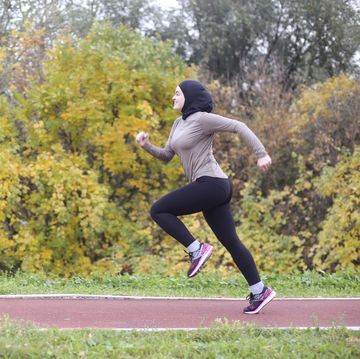- A series of studies show that anger, despite people viewing it as a negative emotion, can actually help you tackle challenging goals.
- Experts suggest instead of trying to combat anger by thinking positive, using that feeling as fuel for your runs.
Tapping into emotional health and visualization isn’t a new concept in sports science. For example, one study published in 2020 suggests positive emotions, like hope, can give athletes a better sense of control and less anxiety during competition. But recent research suggests it isn’t just the uplifting feelings that can make a difference. Even emotions considered negative, like anger, may have a place in reaching performance goals.
The new investigation published in the Journal of Personality and Social Psychology notes that people often believe a state of happiness is ideal, but recent studies have shown that a mix of emotions that include negative states can result in the best outcomes.
To better understand how this blend might work for reaching goals, including athletic aims, researchers reviewed experiments on emotions that involved more than 1,000 participants and those that involved eliciting an emotional response or a neutral state. Emotions ranged from amusement and desire to anger and sadness.
After identifying their emotional state, participants would do a specific task, such as solving word puzzles or trying to achieve a high score on a skiing game. In all of the experiments, anger consistently improved performance compared to a neutral condition or more positive emotions, according to lead author Heather Lench, Ph.D., professor in the department of psychological and brain sciences at Texas A&M University.
That seemed to be true most often when the goals were especially challenging. For example, when two versions of the skiing game were used—one with a single, easier task like doing a jump and another that involved avoiding flags on a difficult slalom course—anger didn’t affect jump performance, she told Runner's World. But when it came to mastering the tougher course, anger seemed to spur participants into being more focused, and even having faster reaction times.
“The results here demonstrate that anger may increase effort toward attaining a desired goal, and that could result in greater success,” Lench said. “Another takeaway is that it may be helpful to change your perception about the use of negative emotions.”
She said that many people see negative emotions like anger as maladaptive—such as a feeling that allowing yourself to be angry during a run will cause you to be distracted or to slow down—but the opposite could be true. Harnessing that emotion and using it to spur your athletic pursuits could be a way to maintain motivation and to tackle particularly challenging goals, according to Lench.
One important distinction here is between anger and aggression, although those are sometimes perceived as synonyms. Anger is an emotion, while aggression is a behavior or action that can be destructive or violent, according to Gregg Henriques, Ph.D., clinical psychologist and author of A New Unified Theory of Psychology.
He told Runner’s World that it can be tricky to feel the emotion without having it fuel the behavior. A technique for that is to simply identify an emotion as it’s happening and visualize using that for a specific goal (like running a quick pace for your next workout!) rather than a catalyst for hostility, he suggested.
“Sometimes, anger is a response if you perceive obstacles to be overwhelming or insurmountable,” added Lench. “Using that anger instead of trying to cover it with positive emotions may be a better strategy for overcoming those obstacles and reaching your goals.”
Elizabeth Millard is a freelance writer focusing on health, wellness, fitness, and food.

















